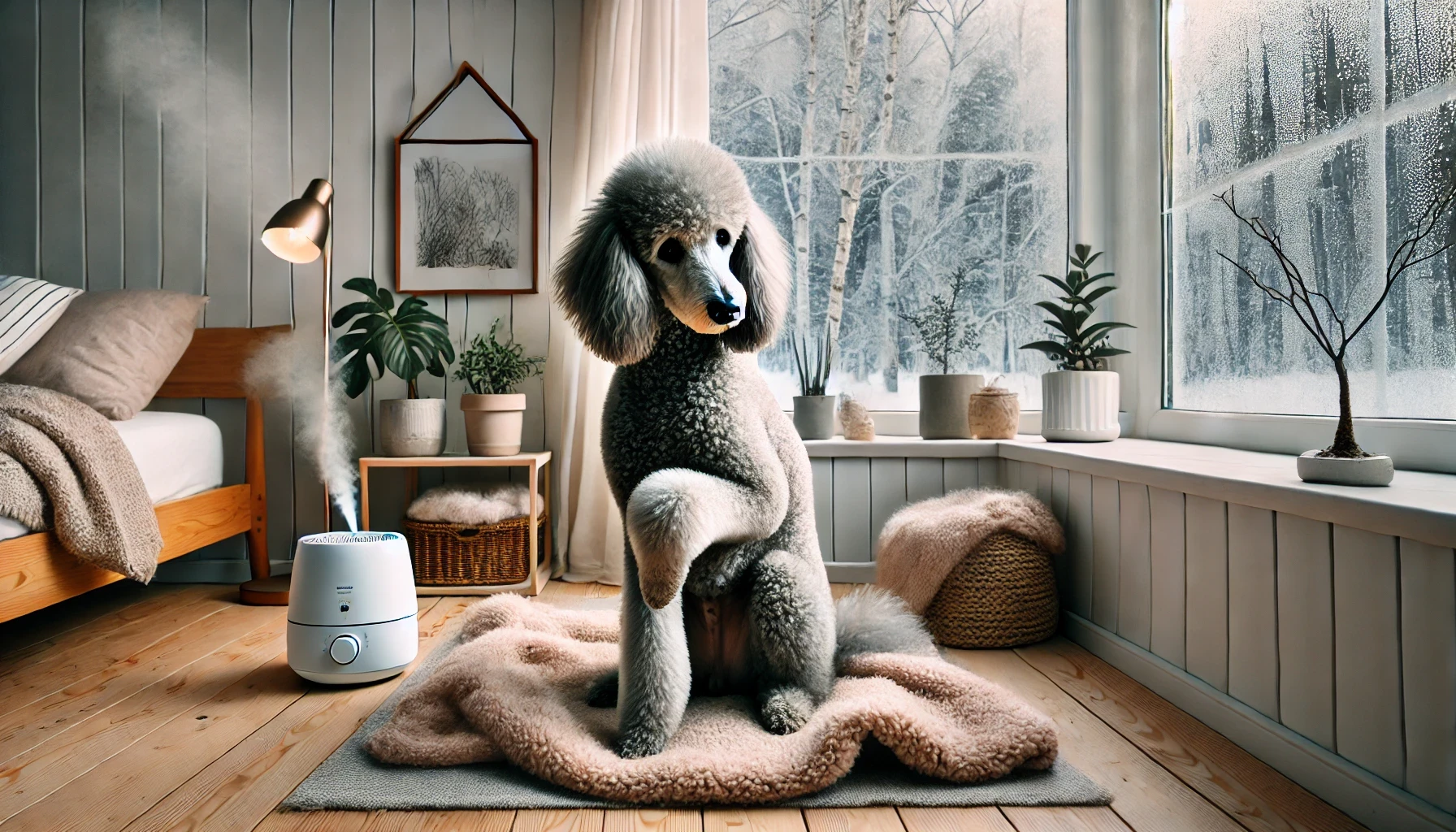On this page
Could Winter Be the Reason for Your Poodle’s Itchy Skin?
Yes, winter can be a major cause of itchy skin in your 7-year-old Poodle. The cold season often brings lower humidity, which dries out your dog’s skin and coat, leading to discomfort and itchiness. Poodles, with their curly, hypoallergenic coats, are particularly prone to dryness because their hair traps less natural oil compared to other breeds. This makes maintaining hydration and proper skin care essential during colder months.
Dietary factors can also worsen the issue. A lack of omega-3 fatty acids, essential for healthy skin, or exposure to allergens in winter-specific foods could be contributing to your Poodle’s irritation. Addressing these factors promptly can improve your dog’s comfort and overall health.
Discover how to soothe your Poodle’s itchy skin with Dosty’s care tips. Download the app now!
Why Does Winter Make Your Poodle’s Skin Itchy?
Could the cold weather itself be causing your Poodle’s discomfort? Yes, the environmental changes in winter often lead to dry, irritated skin.
Key Winter Skin Challenges for Poodles:
Low Humidity: Indoor heating systems and cold air strip moisture from the skin.
Reduced Natural Oils: Poodles produce less oil, making their skin prone to dryness.
Increased Allergens: Winter brings new allergens, such as dust mites and mold, indoors.
Thicker Coat Growth: Seasonal coat changes can trap debris and irritate the skin.
Dr. Emily Larson explains, “Poodles, like other breeds with curly coats, need extra skin hydration during winter to prevent dryness and flaking.”
Prevention Tips:
Use a humidifier to increase moisture in your home.
Limit baths to avoid stripping natural oils; use moisturizing shampoos.
Groom regularly to remove debris and improve air circulation through the coat.
What Are the Signs of Winter Skin Irritation in Poodles?
Does your Poodle show specific symptoms of winter-related skin issues? Yes, itchy skin often presents alongside other signs of discomfort.
Common Symptoms:
Excessive Scratching: Persistent itching is the most obvious sign.
Flaky or Scaly Skin: White flakes on your dog’s coat indicate dryness.
Redness or Inflammation: Visible irritation on the belly, paws, or ears.
Hair Loss: Excessive scratching can lead to bald patches or broken hair.
Behavioral Changes: Increased restlessness or irritability due to discomfort.
Dr. Laura Bennett advises, “Paying attention to early symptoms of dry skin can prevent it from developing into more serious conditions like infections or hot spots.”
What to Do:
Inspect your Poodle’s coat and skin weekly for signs of dryness.
Schedule a vet visit if redness or hair loss persists.
Introduce soothing balms or sprays for immediate relief.

How Can You Treat Winter-Related Itchy Skin in Poodles?
Is professional care necessary to treat itchy skin? Yes, a combination of home remedies and veterinary advice can effectively address the issue.
Steps to Treat Itchy Skin:
Hydrating Baths: Use oatmeal or aloe-based shampoos to soothe irritation.
Topical Treatments: Apply vet-recommended moisturizers or anti-itch sprays.
Omega-3 Supplements: Add fish oil to your Poodle’s diet to improve skin hydration.
Allergy Management: Identify and eliminate allergens causing irritation.
Dr. Michael Carter explains, “Winter skin care for Poodles involves both external treatments and dietary adjustments to restore balance.”
Comparison With Other Breeds:
Unlike Labradors, whose coats retain more natural oil, Poodles require frequent moisturizing to prevent dryness.
However, their hypoallergenic coat makes them less prone to dander-related itching.
Can Diet Help Reduce Winter Itchiness in Poodles?
Could your Poodle’s food be a factor in their skin condition? Yes, proper nutrition is key to maintaining healthy skin during winter.
Dietary Solutions:
Omega-3 Fatty Acids: Found in fish oil, these promote hydration and reduce inflammation.
Zinc and Vitamin E: Essential for skin repair and maintaining elasticity.
Hydrating Foods: Incorporate moisture-rich ingredients like pumpkin or cucumber.
Elimination Diets: Rule out food allergies that may worsen skin irritation.
Dr. Sarah Thompson advises, “A balanced diet tailored to your Poodle’s needs can significantly improve their skin health, especially during seasonal changes.”
Recommendations:
Avoid kibble with artificial additives or low-quality ingredients.
Consult your vet for hypoallergenic or skin-supportive food options.
Introduce supplements gradually to monitor tolerance.
Take the stress out of winter care with Dosty’s expert tools and resources. Download the app now!”
How Can Grooming Help Relieve Winter Itchiness?
Is regular grooming important for managing winter skin issues? Yes, consistent grooming keeps your Poodle’s coat healthy and itch-free.
Grooming Tips for Winter:
Brush Daily: Remove debris and distribute natural oils throughout the coat.
Moisturize After Baths: Apply leave-in conditioners or grooming sprays.
Clip Fur Strategically: Keep the coat manageable but long enough to protect the skin from cold air.
Paw Care: Apply balm to prevent cracks and irritation on the paw pads.
Dr. Rebecca Allen recommends, “Winter grooming for Poodles should focus on hydration and keeping the coat clean to avoid trapping irritants.”
Why Grooming Matters:
It prevents matting, which can irritate the skin and worsen itchiness.
Regular brushing stimulates oil production, enhancing skin health.

Conclusion: Helping Your Poodle Stay Comfortable in Winter
Winter-related itchy skin in a 7-year-old Poodle is a manageable condition with the right care. From increasing hydration and improving diet to implementing a consistent grooming routine, these strategies ensure your dog remains comfortable and healthy throughout the season. For persistent issues, consult your veterinarian to rule out underlying conditions.


